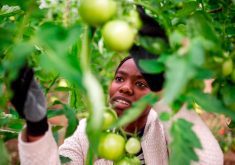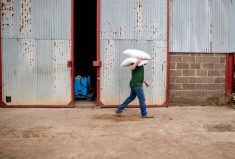[UPDATED: March 21, 2020] Temporary foreign workers will be permitted to enter Canada, despite travel bans and border closures that, for a time, sent agriculture organizations scrambling.
“The presence of temporary foreign workers on our farms and in our agrifood businesses is absolutely necessary. It is nothing more than a food security issue,” said federal Agriculture Minister Marie-Claude Bibeau in a statement late March 20.
“We have made sure that the supply chain is not compromised by closing the borders and we now need thousands of field workers for the seed season, as well as for the processing of soil and the sea.”
Read Also

VIDEO: Manitoba’s Past Lane – Jan. 31
Manitoba, 1946 — Post-war rations for both people and cows: The latest look back at over a century of the Manitoba Co-operator
The exemption includes seasonal agriculture workers, fish and seafood workers, caregivers and other temporary foreign workers.
The feds also added a temporary change to the labor market impact assessment process for employers in the agriculture and food processing sectors, canceling the two-week recruitment period for the next six months.
On March 16, Prime Minister Justin Trudeau announced that foreign nationals from all countries except the U.S. would be temporarily barred from entering Canada in response to the evolving threat of the COVID-19 virus.
Canada needs about 60,000 workers from Mexico and Caribbean nations for the agriculture sector, according to one report while seasonal paid workers make up 53 per cent of Canada’s paid agricultural work force according to the Canadian Horticultural Council.
On March 19, federal Public Safety Minister Bill Blair told reporters that temporary foreign workers (TFWs) and seasonal agricultural workers (SAWs) would be allowed into the country provided they observed a 2-week quarantine, however it wasn’t clear if this applied to workers other than from the United States.
In Manitoba, Beth Connery, labor chair of the Canadian Horticultural Council, said she along with several other organizations, put together a document laying out the repercussions if TFWs were barred from entry, and giving suggestions on risk mitigation if workers were let into the country.
The group sent the document to the federal cabinet the evening of March 18 with hopes it would help the government make a decision on how to admit TFWs.
“They [the federal government] keep reiterating they’ll do everything needed to keep Canadian’s safe,” Connery said. “We spend our lives producing safe food for Canadians… we want everyone to be safe and healthy and that just extends into this situation.”
Connery was also concerned with how to get workers to Canada. Many airlines have severely restricted flights. The group discussed chartering planes to fly in workers. Some farms have done this in peak seasons before, she said.
On the ground, workers will need to self-isolate for 14 days just like any other international travelers, Connery said. As farmers already provide these workers with housing, it “should be totally doable,” Connery said.
It’s not clear if TFWs could work immediately, provided they stay on the farms. Connery said information they have suggests food isn’t a vector for COVID-19.
Connery, who employs TFWs herself, said some workers have reached out to say they’re ready to come. Many have travelled her Portage-area farm for many years to provide for their families. The workers have indicated they’re already in tune with safety messaging in their home countries and on board to follow protocol once they arrive.
Earlier in the week, Manitoba Beekeeper Association chair Mark Friesen told the Co-operator honey producers were “freaking out right now” as many of them would soon need their workers. Two weeks delay might be doable, he said. Four weeks would be too late.
“Farmers are pleased to see the government respond so promptly to the looming shortage of agri-food workers and we are committed to working with all the appropriate agencies and departments to ensure their entry maintains strict public health protocols to prevent further spread of COVID-19,” said Mary Robinson, president of the Canadian Federation of Agriculture in a statement on March 20.
“We are still reviewing the details and will be in close contact with all relevant departments and industry stakeholders over the coming days to ensure these workers arrive safely and on time, while responsibly adhering to all public health requirements. We commend the government’s quick reaction, ensuring the continued resilience of the Canadian food supply during these difficult times,” Robinson said.
–with files from David Fraser, Allan Dawson















